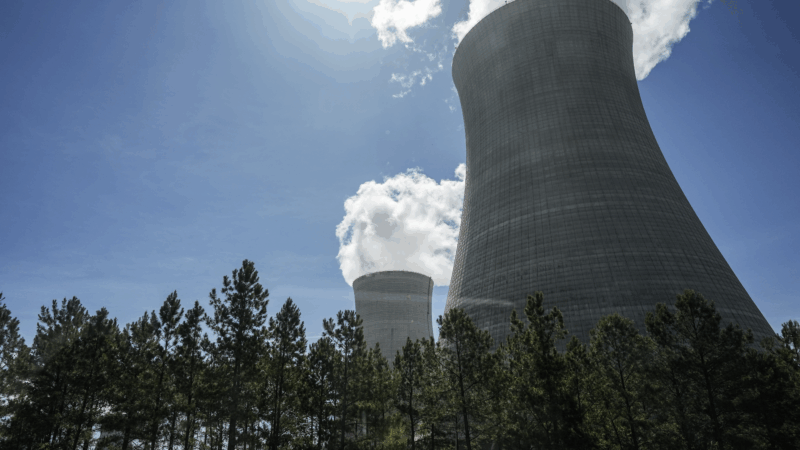President Trump fires a member of the Nuclear Regulatory Commission
President Trump has fired one of the five members of the independent commission that oversees the nation’s nuclear reactors.
Nuclear Regulatory Commissioner Christopher T. Hanson was terminated on Friday, according to a brief email seen by NPR from Trent Morse, the White House Deputy Director of Presidential Personnel. The e-mail said only that Hanson’s “position as Commissioner of the U.S. Nuclear Regulatory Commission is terminated effective immediately.”
“All organizations are more effective when leaders are rowing in the same direction,” White House Deputy Press Secretary Anna Kelly told NPR via e-mail. “President Trump reserves the right to remove employees within his own Executive Branch who exert his executive authority.”
The Nuclear Regulatory Commission said it could conduct its work without Hanson. “The NRC has functioned in the past with fewer than five commissioners and will continue to do so,” the agency said in a statement.
In a statement shared with NPR, Hanson said that he was fired “without cause,” and that he had devoted his term to “preserving the independence, integrity and bipartisan nature of the world’s gold standard nuclear safety institution. … I continue to have full trust and confidence in their commitment to serve the American people by protecting public health safety and the environment.”
Hanson was appointed to the NRC by President Joseph Biden in 2020 and then reappointed in 2024. His current term was set to expire in 2029, according to a bio on the NRC’s website that has since been removed.
Some observers of the nuclear industry were sharply critical of the decision. “I think that this coupled with the other attacks by the administration on the independence of the Nuclear Regulatory Commission could have serious implications for nuclear safety,” says Edwin Lyman, director of nuclear power safety at the Union of Concerned Scientists, an environmental watchdog group. “It’s critical that the NRC make its judgements about protecting health and safety without regard for the financial health of the nuclear industry.”
The NRC was established by Congress in 1974 to strictly regulate nuclear reactors and protect Americans from exposure to radiation. By design, it has been overseen by a set of presidentially-appointed and Senate-approved commissioners, who are appointed to five-year terms. The White House has typically refrained from interfering with the agency, which is credited with maintaining a strong safety record at America’s nuclear reactors since a partial meltdown at the Three Mile Island nuclear plant in 1979.
Last month, President Trump signed an executive order mandating sweeping reforms to the NRC. The order called for a “wholesale revision” of the agency’s safety regulations in coordination with the White House Office of Information and Regulatory Affairs and the Department of Government Efficiency. It also calls for reductions in force at the agency, and for a reconsidering of some radiation safety standards.
The order was one of four signed by the president to promote America’s nuclear industry. Trump signed the orders flanked by smiling industry executives, including one whose company had a reactor design previously rejected by the NRC, because the agency said it had failed to supply information about possible accident scenarios.
Top 5 takeaways from the House immigration oversight hearing
The hearing underscored how deeply divided Republicans and Democrats remain on top-level changes to immigration enforcement in the wake of the shootings of two U.S. citizens.
Snowboarder Chloe Kim is chasing an Olympic gold three-peat with a torn labrum
At 25, Chloe Kim could become the first halfpipe snowboarder to win three consecutive Olympic golds.
Pakistan-Afghanistan border closures paralyze trade along a key route
Trucks have been stuck at the closed border since October. Both countries are facing economic losses with no end in sight. The Taliban also banned all Pakistani pharmaceutical imports to Afghanistan.
Malinowski concedes to Mejia in Democratic House special primary in New Jersey
With the race still too close to call, former congressman Tom Malinowski conceded to challenger Analilia Mejia in a Democratic primary to replace the seat vacated by New Jersey Gov. Mikie Sherrill.
A daughter reexamines her own family story in ‘The Mixed Marriage Project’
Dorothy Roberts' parents, a white anthropologist and a Black woman from Jamaica, spent years interviewing interracial couples in Chicago. Her memoir draws from their records.
FBI release photos and video of potential suspect in Guthrie disappearance
An armed, masked subject was caught on Nancy Guthrie's front doorbell camera one the morning she disappeared.






